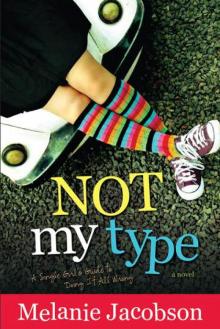- Home
- Melanie Jacobson
Southern Charmed Page 13
Southern Charmed Read online
Page 13
Worry crept across his face. “Uh, is this where you tell me you have a great business opportunity that can improve my life?”
I snorted. “Funny, Max. Wait, no. Not actually funny.”
“It was.”
“A little bit.”
“I’ll take it.” He turned back to the board. “So how’s she going to do her project?”
I sighed. “I don’t know yet. She’s still gathering information, but she hasn’t had a breakthrough idea, and that’s where I can’t help her. It has to come from her so that she’ll execute it with total passion. She’s meant to be great. I can feel it.”
“There you go being amazing again.”
“I’m not. This isn’t about me. She doesn’t see her own potential. Every Sunday after I turned twelve, I stood up and said I had divine nature and individual worth. Nobody’s telling her that, and if I tried, she’d give me her “okay, crazy white girl” look, but I’ve been trying to show her since August. I realized I was running out of time, and I have to make these last two months of school count, so I’m making her enter this big history competition to force her to step up her game. Achievement breeds self-esteem and all that. If she can tap into her natural grit and throw herself into this, she’ll rock. I know it.”
“You really love this, don’t you?”
“No, I kind of hate doing bulletin boards.”
“Funny,” he said with a shoulder nudge. “Seriously, you must love coming here every day.”
I glanced around at the classroom, the other walls covered in posters of some of my heroes, favorite quotes, examples of student work. Bookshelves lined the wall beneath the bank of windows, and bins sat on top of each shelf, overflowing with assignments that would take me hours to grade. Small bits of paper littered the floor around Kendyl Harris’s desk, as usual, because she picked the ragged edges off her notebook paper and dropped them on the ground when she was bored in seventh period, and I always forgot to make her stop and pick them all up.
The classroom walls probably should have been repainted in the last couple of years, and scuff marks and sun fading marred different sections. But I smiled at all of it before I turned back to Max. I loved it so much it never left me. I carried these kids around with me wherever I went, the weight of their problems, the joy of their successes pressing on my mind or nestling in the corners of my heart, always. “I do. I love it.”
“That’s really cool.”
His complete admiration was evident, but I only shrugged. I wasn’t going to take credit for being a good human just because I was lucky enough to love my job.
I suddenly felt too awkward to meet his eyes. I reached over and smoothed down a corner of the bulletin board instead. “I’m trying to do right by these kids, that’s all.”
“You are. You matter. And they’re going to love your board.”
“All hail Pinterest.”
He shook his head and pulled me close to him, leaning down to steal a kiss but faking right at the last minute to whisper “Pinterest” in my ear. I pinched his arm, and he stepped back with a laugh. “You mad, Lila Mae? Is it because you want me to kiss you for real?”
I grabbed his shirt and pulled him down for the kiss I wanted before he could tease me again, and when it wrung a small growl out of him, I smiled against his lips. “I win,” I whispered.
He answered with another kiss.
When he let go, he took a step back and looked around the classroom like he needed to reorient himself. He gave his head a tiny shake. “Hey, sorry to be unsuave, but is there a bathroom nearby?”
I pointed the direction down the hallway. “Halfway down on the right.”
“Be right back.”
I picked up bits of paper from our decorating efforts, but the silence in the room was deeper than usual, and I stilled, trying to figure out why. The reflection in the wall of windows caught me, a vignette of me next to our dinner trash waiting to be thrown away. Two of everything.
That was it. Ever since my mission, I’d dreamed of what married life would be like: quiet nights at home, cooking together, or Saturday mornings sharing sections of The Advocate, arguing over who got the sports pages first. I’d pictured neighborhood walks and listening to my husband talk about work. I’d show him hilarious test answers or share my frustrations when I couldn’t get through to a kid or brainstorm ideas for lessons. Those dreams had overtaken visions of wedding dresses and bridal bouquets a long time ago.
This feeling, these last two hours of being in it together, the ease, the way the work went faster—this was the dream. Warmth spread through my chest, and I knew a prompting when I felt one. I closed my eyes and sent up a quick prayer that I would understand what to do with this insight, and as I finished, Max walked back in.
“Hi,” he said, pausing at whatever it was he saw in my expression. “Something changed. What’s up?”
I took a deep breath. My mind had changed. My heart had changed. They’d changed a while ago, but I was only now accepting them. I’d never clearly seen the face of the guy in my daydreams, but looking at Max, I could see it now. “Nothing’s wrong. I’m going to clean up this dinner mess.”
He hurried over to help me, scooping up most of it before I even reached the desks.
“Thanks again for bringing this,” I said, dropping a crumpled napkin into the trash. “So you love their food too?”
“Definitely. It takes a lot of willpower not to eat there every other night.” He caught my skeptical look. “Fine, not to eat there every night.”
“What about the rest of it?”
“The rest of what?”
“Everything. Your job. The city. Do you love those too?”
“Sure, it’s been a good trip back.”
A tightness crept into my chest. “Trip sounds really short-term. You’ve been here a few months already, and you could be here for a while longer.”
“I mean, yeah. I could. It’s hard to say. They move me when they think I’ve proven myself and they’re ready to put me into a bigger office.”
“So it could be a while,” I pressed him. I needed it to be a while.
He shrugged. “Yeah.” By now, he’d gathered up all the trash, and he stood still, watching me, his eyes scanning my face like they were looking for a hidden latch to a secret door.
“That’s not really a trip. You’re living here. In Baton Rouge. You live here,” I repeated.
“That’s what I meant.”
“But you said trip.”
Another shrug. “I didn’t mean anything in particular.”
“You meant that this is temporary.”
He sighed and leaned on the desk behind him. “I never said it wasn’t.”
“I know.” I knew it too well, but his words ate away at the warmth I’d felt moments before, termites that fed on happiness, stripping it down to nothing. “I guess I was hoping your perspective on being here had changed.” Like that you love it and you can’t leave my city or me until we’ve figured us out. I held those words back. Barely.
“Perspective is a funny thing. Baton Rouge is your whole world. This city will never have a better spokesperson. But if you had more experience outside of it, it wouldn’t feel so much like the end of the line for you.” He winced. “Wait. End of the line has a negative connotation, and I don’t mean anything negative. I mean that I wonder how strongly you would feel about spending the rest of your life here if you had more time in other places.”
“You think I only love it here because I haven’t been to enough other places to know better?”
“No! I mean, yes, I mean those words but not in that tone.”
“Did my tone sound condescending? Because that’s how your words sounded.”
“Are we about to have a fight?”
“That depends on if you’re willing to walk back what you just said.” I wasn’t mad yet, but I could feel it coming on.
He scrubbed a hand through his hair. “When you have a chance to live outside of yo
ur hometown, you come back to it with new eyes. Sometimes you think it’s as great as ever, and sometimes you decide it’s not so great when you see what else is out there.”
It was a punch in the stomach. “You’re saying that Baton Rouge isn’t that great compared to other places?”
“No! It’s so much better than I let myself believe it was when I lived here. But here’s an example: I was in this little village in Keliloha, and I met this kid named Haja. And he had no desire to live anywhere else but Keliloha, even though he didn’t have much of anything there, including opportunities. It was what he knew, and it was enough. Then his mother got malaria and Doctors Without Borders arranged to have her transported to the city, which had an actual hospital where she could get the help she needed. But she was terrified and wouldn’t go unless Haja went with her.
“They were there for three weeks, and as she got better, he got to explore. Suddenly his village was too small to hold him. For the next two years, he did everything he could to get admitted to the technical school, and a couple of months ago, he sent me an e-mail telling me he was about to get certified as an X-ray technician at the hospital and how happy he is in the bigger city of Madirovalo. But he’d thought he was happy in Keliloha until he saw more options.”
“Basically you think if I went anywhere besides Baton Rouge, I’d change my mind about wanting to live here.” It was unbelievable. Somehow the smug, arrogant boy I remembered from years ago had reappeared, even though his tone was kind and thoughtful. The underlying thinking was so messed up. “Here’s the thing, Max. I served a mission. Did you know that?”
Surprise crossed his face. “I didn’t. How come I didn’t know that?”
“I don’t know. Didn’t come up, I guess. But I served in London, which is not a bad gig. I got to have a completely cosmopolitan experience there. And then I decided to do a study abroad in France for a semester because I knew the language and LSU sponsors a great program for history majors there. So I spent time in Paris and in the countryside, and I got that whole experience. So basically, I lived in Europe for two years. Then, on top of that, I’ve gone on two Habitat for Humanity trips, one to Haiti and one to Columbia for a month each. I’ve truly and fully experienced the world, Max. I loved all of it, but all it did was deepen my appreciation for what I have here.” I wrestled a desk back into place so it faced the front again. “Thanks for helping me tonight. It’s probably time for me to get home. I need to check on my mom.”
“Wait, Lila. I’m sorry.”
“It’s okay.”
“No, I mean it. I’m sorry. I was being insensitive.”
“It’s fine. There’s nothing to apologize for.” It would be like making him apologize for being who he was. His whole Haja story showed that he was more of his teenage Max-self at his core than I had realized, the guy who still believed Baton Rouge was a backwater, just less of a backwater than the rest of the state. But it was a backwater I was never going to leave.
The warmth in my chest was long gone, replaced by tight, prickly misery. How had I read that so wrong? I had talked myself into believing I’d had a spiritual prompting because I liked Max so much. But I loved Mom too much to ever leave her, to rip my roots out of the soil and walk away. So what was I going to do with these feelings for Max when he saw no place here for himself to grow?
Chapter 16
I went to bed miserable, even after a long prayer to try to figure out what I was supposed to be doing. I kept thinking, It will work out. Obviously I needed to sign up for meditation classes; maybe if I learned to block out the voice in my head telling me what I wanted to hear over and over again, I could hear what it was that God wanted for me.
I woke up exhausted after a long dream about failing to make red beans and rice. I had always thought that was a dish I could make in my sleep: nope. In my dream, I’d been soaking the beans, but no matter how often I checked them, they were never ready to cook. It was one of the dumber stress dreams I’d had.
Work started off rough too. Jarrod Cole laid into me as soon as he walked into the classroom. “Miss Guidry has a boyfriend, y’all. I saw him trying to find her last night.”
“Was he fine?” Keisha Brown called from the back of the room.
“I don’t pay attention to that,” Jarrod said, looking offended. “He look rich though, like he got on some high-dollar suit pants and Sunday shoes.”
The kids all catcalled, and Keisha hollered, “Yeah, Miss Guidry, reeling in her sugar daddy!”
“Stop with that mess,” Kiana said. She had her eye on me, not Keisha, and she must have seen the thunder brewing in my expression. “You really think Miss Guidry is going to date some fool because he got pricey shoes? Maybe you, Keisha, but not her.”
That earned a chorus of “Ooohs” and “Burn!”
“Yeah, you right,” Keisha said. “I like a man that look good.”
“I look good, baby,” Jamarcus called.
“You wish you did,” Keisha said, to laughter.
“I’m serious, Keisha,” Kiana said, not looking like she found any of it funny. “Don’t you think any guy coming around Miss Guidry is going to be lucky if she gives him the time of day?”
“Truth!” Keisha’s best friend Georgia said. “That’s the truth.”
A half dozen shouts of “Amen!” and “Word!” followed, and I winked at Kiana for turning my morning around. “Two-point bonus on the next test,” I said, and she smothered a grin before she busied herself looking for something in a binder.
Ten minutes before lunch, my classroom door opened, and a city marched through it.
No, really.
A scale model of Baton Rouge on a piece of wood about four feet wide was coming through the door at an angle. I couldn’t see who was carrying it over the tall buildings of downtown Baton Rouge, but I recognized the shoes Jarrod had mentioned. The city floated toward me, and I moved out of Max’s way as he set it on my desk. His face was flushed, and he had to wipe some sweat from his forehead when he straightened.
“Who’s that, Miss Guidry?” at least twelve kids said on top of each other.
“This is Mr. Archer. Um, why are you here, Mr. Archer?”
“I wanted to see you,” he said, setting off a flood of catcalls.
“Y’all, he doesn’t even like Baton Rouge,” I told the class. “He’s probably here to set that thing on fire.” I examined it more closely. It was a professional-looking model, except for the homemade construction paper flags on toothpicks stuck in different spots. One flew at the state capitol, one at the riverboat dock . . . Wait a minute.
“I don’t hate Baton Rouge,” he said. “This is my proof. Is it okay if I steal a few minutes to offer a review of some modern city history here in your history class?”
I gave him a “have at it” wave and took an empty seat in the third row, my arms folded while I waited to see what he was up to. It wasn’t like I was going to be able to get the class to focus even if I kicked him out now. Also, I was dying to know.
“I’m learning to like Baton Rouge a lot. For example,” he said, pointing to a flag, “this is a place by my house that has the best boudin balls. I don’t get boudin where I’m from. And here,” he said, pointing to a flag that looked like it was on the Shenandoah lakes, about right where my parents’ house would be, “is where I almost kissed my first girl.”
More catcalls sounded, and my face lit on fire. He meant me, but he meant the night under the dinghy when the lightning bugs had woven a spell around us. He wasn’t done. “Here is where I learned that your city’s history is as long and as rich as my city’s history”—pointing to the state capitol—“and here is where I figured out that Baton Rouge high school football is way more fun than Philly high school football.” That flag was University Academy. He pointed out other flags, including places where he’d discovered a favorite milkshake or fishing spot.
The kids seemed to like it, but when the bell rang, one of the boys stopped by the model and squinted.
“That was better than taking notes, dude, but it didn’t exactly sound like history.” And he walked out.
I waited until the kids had all left before I shut the door so my students would know I wasn’t available for lunch. “Where’d you get this?” I asked, walking over to peer at it more closely.
“Hey.” He slid his hands into his pockets and waited.
“Hey.”
“Sorry I interrupted your class. I tried to time it so I would be here for lunch, but I was afraid if I didn’t get here before the bell, this thing would get bumped by giant high schoolers stampeding for food, and it’s on loan.”
“Who has a giant model of Baton Rouge lying around?”
“An architectural firm, for one.” He rested his hands on my shoulders and pulled me toward him enough to drop a light kiss on my forehead. “I’m sorry. Forgive me?”
“Yeah. To be honest, I was putty by the time you got to the first-kiss flag.” I stepped back, aware that kids might come gawking through the window at any moment.
His hands disappeared into his pocket again, and he glanced back at our cell phone display. “How did the kids like it? I was bummed they weren’t all staring at it when I walked in.”
“They might have been if you hadn’t been carrying a city when you showed up.”
“Good point. Still disappointed.”
I smiled. “They loved it, actually. We spent the first half of class talking about it. I think most of them aren’t dreading their projects now.”
“So mission accomplished?”
“That bulletin board is so yesterday. Let’s talk about today. Why are you here with Baton Rouge? You said you were sorry last night. I appreciated it. And I’m not mad at you.”
“But you seemed mad, and I would be too if I were you. I want to make it right.”
I had to give him another smile. “By bringing me a city?”
“I couldn’t sleep last night. I knew I blew it. Bad. So I got up and Googled architectural firms and sent e-mails to several of them asking if any of them had anything like this. I told them it was vitally important—”

 Southern Charmed
Southern Charmed Kiss Me Now: A Romantic Comedy
Kiss Me Now: A Romantic Comedy Painting Kisses
Painting Kisses Wedding Belles: A Novel in Four Parts
Wedding Belles: A Novel in Four Parts The List
The List Not My Type
Not My Type A Timeless Romance Anthology: Summer Wedding Collection
A Timeless Romance Anthology: Summer Wedding Collection